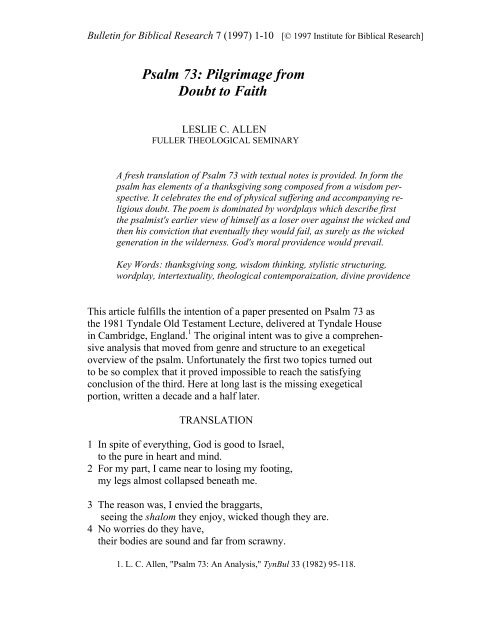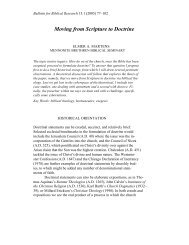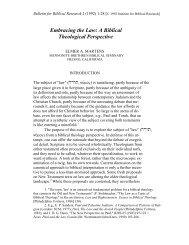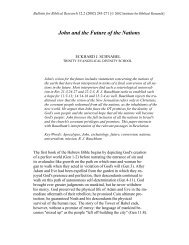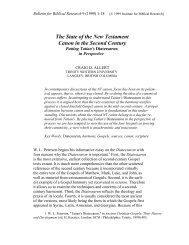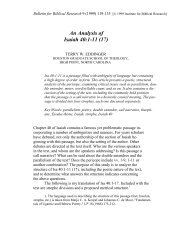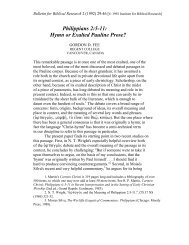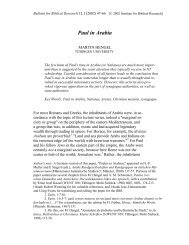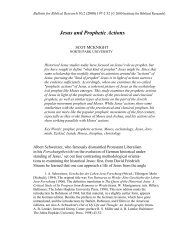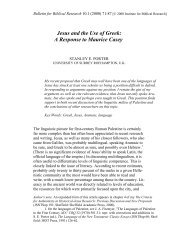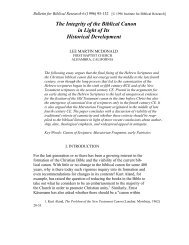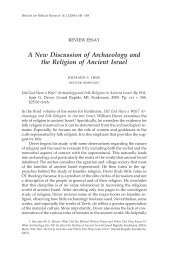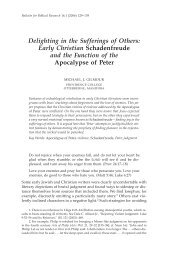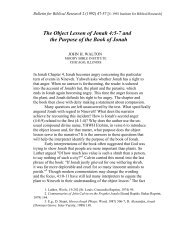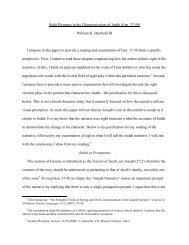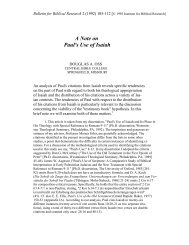Pilgrimage from Doubt to Faith - Institute for Biblical Research
Pilgrimage from Doubt to Faith - Institute for Biblical Research
Pilgrimage from Doubt to Faith - Institute for Biblical Research
Create successful ePaper yourself
Turn your PDF publications into a flip-book with our unique Google optimized e-Paper software.
Bulletin <strong>for</strong> <strong>Biblical</strong> <strong>Research</strong> 7 (1997) 1-10 [© 1997 <strong>Institute</strong> <strong>for</strong> <strong>Biblical</strong> <strong>Research</strong>]<br />
Psalm 73: <strong>Pilgrimage</strong> <strong>from</strong><br />
<strong>Doubt</strong> <strong>to</strong> <strong>Faith</strong><br />
LESLIE C. ALLEN<br />
FULLER THEOLOGICAL SEMINARY<br />
A fresh translation of Psalm 73 with textual notes is provided. In <strong>for</strong>m the<br />
psalm has elements of a thanksgiving song composed <strong>from</strong> a wisdom perspective.<br />
It celebrates the end of physical suffering and accompanying religious<br />
doubt. The poem is dominated by wordplays which describe first<br />
the psalmist's earlier view of himself as a loser over against the wicked and<br />
then his conviction that eventually they would fail, as surely as the wicked<br />
generation in the wilderness. God's moral providence would prevail.<br />
Key Words: thanksgiving song, wisdom thinking, stylistic structuring,<br />
wordplay, intertextuality, theological contemporaization, divine providence<br />
This article fulfills the intention of a paper presented on Psalm 73 as<br />
the 1981 Tyndale Old Testament Lecture, delivered at Tyndale House<br />
in Cambridge, England. 1 The original intent was <strong>to</strong> give a comprehensive<br />
analysis that moved <strong>from</strong> genre and structure <strong>to</strong> an exegetical<br />
overview of the psalm. Un<strong>for</strong>tunately the first two <strong>to</strong>pics turned out<br />
<strong>to</strong> be so complex that it proved impossible <strong>to</strong> reach the satisfying<br />
conclusion of the third. Here at long last is the missing exegetical<br />
portion, written a decade and a half later.<br />
TRANSLATION<br />
1 In spite of everything, God is good <strong>to</strong> Israel,<br />
<strong>to</strong> the pure in heart and mind.<br />
2 For my part, I came near <strong>to</strong> losing my footing,<br />
my legs almost collapsed beneath me.<br />
3 The reason was, I envied the braggarts,<br />
seeing the shalom they enjoy, wicked though they are.<br />
4 No worries do they have,<br />
their bodies are sound and far <strong>from</strong> scrawny.<br />
1. L. C. Allen, "Psalm 73: An Analysis," TynBul 33 (1982) 95-118.
2 Bulletin <strong>for</strong> <strong>Biblical</strong> <strong>Research</strong> 7<br />
5 They lack the troubles of other mortals<br />
and are free of human mis<strong>for</strong>tunes.<br />
6 So they can vaunt arrogance like a lei<br />
and deck themselves with violence.<br />
7 The wrongdoing they commit springs <strong>from</strong> within, 2<br />
their minds and hearts are full of evil fantasies.<br />
8 They mock and talk maliciously,<br />
<strong>from</strong> their position of power they talk menacingly.<br />
9 They speak as if the sky was theirs,<br />
as if the earth was under their control.<br />
10 So they have their fill of bread 3<br />
and plenty of water <strong>to</strong> drink!<br />
11 Yet they declare, "How does God know?"<br />
Does the Most High have any knowledge?"<br />
12 Here then are the wicked,<br />
constantly content and possessing wealth galore.<br />
13 On the other hand, it got me nowhere <strong>to</strong> keep my heart and<br />
mind clean<br />
or <strong>to</strong> wash my hands, doing no harm.<br />
14 I was suffering daily mis<strong>for</strong>tune;<br />
my affliction never missed a morning.<br />
15 I could not declare and tell my problem,<br />
else I would have let your family down.<br />
16 Trying <strong>to</strong> think it through,<br />
I found it troubled me--<br />
17 until I entered God's sanctuary,<br />
where I realized their eventual fate.<br />
18 In spite of everything, you have set them on a slippery path,<br />
making them fall and be ruined.<br />
19 On what a course of sudden destruction they are set,<br />
destined <strong>to</strong> suffer a terrifying doom!<br />
20 After you wake, like a dream<br />
you will despise them, when you arouse yourself, like figments.<br />
21 Because my heart and mind was embittered,<br />
my conscience has been pricked.<br />
2. The MT "their eyes come out <strong>from</strong> fat" is strange and provides a poor parallel<br />
<strong>to</strong> v. 7b. The Greek and Syriac versions presuppose wOmnfwO(J "their iniquity" wOmn'y(' "their<br />
eyes." Then blex' "fat" is <strong>to</strong> be taken as the fat of the s<strong>to</strong>mach, a seat of thinking or feelings<br />
as in 17:10. Cf. the NIV "<strong>from</strong> their callous hearts comes iniquity."<br />
3. In "Psalm 73" (117-18) I argued <strong>for</strong> a reading Mxel@fmi w@(b@;#oyi in place of the odd<br />
MT MloxJ wOm@(a bw@/y#$iyf "his people returns here," and in v. 10b a repointing of w@cmf@yi (<strong>from</strong><br />
hcm) "are drained, drunk" as an active verb, w@c@moyf (<strong>from</strong> Ccm) "they drink." Verse 10<br />
sarcastically comments that the wicked enjoy blessings reserved by rights <strong>for</strong> the<br />
pious: cf. Isa 33:16.
ALLEN: Psalm 73: <strong>Pilgrimage</strong> <strong>from</strong> <strong>Doubt</strong> <strong>to</strong> <strong>Faith</strong> 3<br />
22 For my part, I was stupid and not thinking,<br />
like a brute beast in relation <strong>to</strong> you.<br />
23 In fact, I am with you continually,<br />
you take hold of my right hand.<br />
24 You guide me with your advice<br />
and will eventually bring me <strong>to</strong> a position of honor.<br />
25 Whom else do I have in heaven?<br />
Apart <strong>from</strong> you, I want nothing on earth.<br />
26 My body failed, 4 along with my heart and mind,<br />
but God is the rock of my mind and heart,<br />
and the constant ground of my support.<br />
27 Here is the truth: those far <strong>from</strong> you will lose their lives.<br />
You do away with anyone who strays wan<strong>to</strong>nly <strong>from</strong> you.<br />
28 I, <strong>for</strong> my part, find it good <strong>to</strong> come near <strong>to</strong> God,<br />
taking shelter in the Lord Yahweh,<br />
in order <strong>to</strong> tell of all the works you have done.<br />
FORM<br />
Particular psalms fall in<strong>to</strong> a variety of <strong>for</strong>m-critical categories. While<br />
there has been dispute over the category of Psalm 73, the most favored<br />
one is that of a song of thanksgiving. 5 The thanksgiving song<br />
celebrated the resolution of a personal crisis that had at an earlier<br />
stage been voiced in an individual lament. The song was typically recited<br />
at a service of thanksgiving and accompanied by a thank offering,<br />
whose meat would be eaten later at a thanksgiving meal. The<br />
song of thanksgiving tends <strong>to</strong> have six elements. They are: a resolve <strong>to</strong><br />
give thanks, an introduc<strong>to</strong>ry summary of the resolution of the crisis,<br />
a description of that crisis, a report that God had heard the prayer<br />
of lament and in response acted affirmatively, generalized teaching,<br />
and renewed thanksgiving. These elements may be seen clearly in<br />
Psalm 30. 6<br />
Here v. 1 reflects two elements, the resolve <strong>to</strong> give thanks and<br />
generalized teaching, learned in the school of recent experience and<br />
passed on <strong>to</strong> the congregation. 7 The combination of elements causes<br />
4. The perfect verb hlfkf@ is <strong>to</strong> be taken as a past tense with M. E. Tate, Psalms 51-<br />
100 (Dallas: Word, 1990) 228, 230.<br />
5. For documentation and detailed argumentation see my "Psalm 73," 107-18. In<br />
general, bibliographical references given there will not be repeated in this essay.<br />
6. There the first two elements appear in vv. 1-3 [Heb. 2-4], the third in vv. 6-7<br />
[7-8], the fourth in vv. 8-11 [9-12], the fifth in vv. 4-5 [5-6], and the sixth in v. 12 [13].<br />
7. In "Psalm 73" (112, 114), I followed L. G. Perdue (Wisdom and Cult [Missoula:<br />
Scholars Press, 1977] 287-89), in analyzing v. 1 as a proverb. However, it can be adequately<br />
explained as a thanksgiving element.
4 Bulletin <strong>for</strong> <strong>Biblical</strong> <strong>Research</strong> 7<br />
it <strong>to</strong> lack the personal note common in the thanksgiving song. 8 It<br />
presupposes and echoes the brief hymn sung at the thanksgiving<br />
service:<br />
Give thanks <strong>to</strong> Yahweh of hosts,<br />
<strong>for</strong> Yahweh is good . . . (Jer 33:11)<br />
The second element, summarizing the resolution of the crisis, appears<br />
in v. 2, as the emphatic position of the two Hebrew terms <strong>for</strong> "almost"<br />
suggest. 9 The sentiment appears in a fuller <strong>for</strong>m in 94:17, where one<br />
of the Hebrew terms recurs:<br />
If Yahweh had not been my help,<br />
my soul would quickly have dwelt in the silent land.<br />
The third and fourth elements, describing at length the crisis and its<br />
resolution, seem <strong>to</strong> be reflected in vv. 3-26, while the final element<br />
of renewed thanksgiving is found in v. 28.<br />
There is more going on in Psalm 73 than the simple designation<br />
"thanksgiving song" suggests. The standard song celebrated release<br />
<strong>from</strong> a physical crisis, sickness and/or persecution by particular enemies.<br />
While physical trouble is mentioned in v. 14, it is part of a<br />
much larger problem, a problem of the mind and heart (v. 26). 10 The<br />
crisis is the spiritual and intellectual problem of v. 3, which the<br />
psalmist's own suffering compounded. The psalm is thereby stamped<br />
as belonging <strong>to</strong> the wisdom tradition of Israel. Its use of wisdom vocabulary<br />
supports this attribution, while its contrast between the<br />
wicked and the righteous constitutes a standard motif of wisdom<br />
compositions. Was Psalm 73 primarily composed <strong>for</strong> use in the wisdom<br />
school or <strong>for</strong> recitation in the temple court? Reference <strong>to</strong> a congregation<br />
is characteristic of the cultic song: its absence might<br />
suggest the <strong>for</strong>mer alternative. 11 However, the explicit reference <strong>to</strong><br />
an earlier visit <strong>to</strong> the sanctuary in v. 17 and the implicit reference <strong>to</strong><br />
temple attendance in v. 28 points <strong>to</strong> the latter option.<br />
FINAL STRUCTURE<br />
The best stylistic analysis of Psalm 73 has been given by K.-J. Illman. 12<br />
It falls in<strong>to</strong> six sections, vv. 1-2, 3-12, 13-17, 18-20, 21-26, and 27–<br />
8. While the psalm lacks any direct appeal <strong>to</strong> the congregation, it does exhibit<br />
the thanksgiving song's characteristic mixture of testimony and prayer, indicated by<br />
third and second person references <strong>to</strong> God.<br />
9. "It did not not happen! Yahweh did not let him fall!" (H.-J. Kraus, Psalms 60-<br />
150 [trans. H. C. Oswald; Minneapolis: Augsburg, 1989] 87).<br />
10. The Hebrew term bbfl' "heart, mind" occurs in the psalm no less than six<br />
times.<br />
11. But see n. 8 above.<br />
12. "Till <strong>to</strong>lkningen av Psalm 73," SEÅ 41-42 (1976-77) 120-29, esp. 123-24.
ALLEN: Psalm 73: <strong>Pilgrimage</strong> <strong>from</strong> <strong>Doubt</strong> <strong>to</strong> <strong>Faith</strong> 5<br />
28. The first, third and fourth sections are introduced by an adversative<br />
particle K7)a, and the others by yk@i, a causal or asseverative particle.<br />
In three cases the particle is followed at the beginning of the next line<br />
by yni)jwa "and/but I" (Verses 2, 22 [also in v. 23], 28), and once by the<br />
similar yhi)vwF "and I was" (v. 14).<br />
This structuring is supported by the proportionate length of sections,<br />
Illman noted. Verses 3-12 devote ten lines <strong>to</strong> the wicked, while<br />
vv. 13-17 give five lines <strong>to</strong> the righteous psalmist. This proportion is<br />
reversed in the next two units: vv. 18-20 describe the fate of the<br />
wicked in three lines while vv. 21-26 discuss the psalmist's good <strong>for</strong>tune<br />
in six lines. Verses 1-2 and 27-28 are the introduc<strong>to</strong>ry and closing<br />
two-line borders of the psalm. The intervening material falls in<strong>to</strong><br />
two parts, dealing with the apparent conditions of the wicked and the<br />
psalmist (vv. 3-12, 13-17), and vv. 18-26 presenting the "true" state<br />
of affairs <strong>for</strong> both parties (vv. 18-20, 21-26).<br />
Illman's structural analysis has laid bare the psalmist's arrangement<br />
of the composition in its final <strong>for</strong>m. It represents the wrapping<br />
paper and ribbon, as it were, in which the completed psalm has been<br />
presented <strong>for</strong> recitation. However, the structure Illman uncovered<br />
only determines the size and general significance of the sections of<br />
the final composition. There is a host of cases of repetition and nearrepetition<br />
which his analysis leaves unexplained. They point <strong>to</strong> a dynamic<br />
composition, over against Illman's final static one. This dynamic<br />
composition relates <strong>to</strong> the creative and piecemeal growth of the poem,<br />
as it was written stage by stage. As we shall see, it takes us in<strong>to</strong> the<br />
heart of the poem and reveals the writer's working through aspects<br />
of his problem.<br />
DEVELOPMENT AND MEANING<br />
Verses 1-20, two-thirds of the entire psalm, comprises the first block<br />
of material. It falls in<strong>to</strong> two parts, vv. 1-12 and 13-20. This material<br />
is characterized as a single entity by the pointed repetition of key<br />
terms and motifs <strong>from</strong> its first part in the second. The psalmist's<br />
eventual claims of God's favor <strong>to</strong> the pure in heart, presented at the<br />
beginning (v. 1), was seemingly disproved by the providential blows<br />
that attended his own endeavors <strong>to</strong> cleanse his heart (v. 13). Three<br />
contrasts between the radically different experiences of the wicked<br />
and of the psalmist exacerbated his problem. First, they seem immune<br />
<strong>from</strong> human mis<strong>for</strong>tune, yet he experiences it every day (w@(g@fnuy;,<br />
v. 5; (aw@gnf, v. 14). Second, they lack the troubles of other mortals, while<br />
he has the severe problem of spiritual and intellectual perplexity (lma(j,<br />
v. 5; lmf(f, v. 16). Third, they make insolent declarations about God, but<br />
he is constrained against declaring his problem out of respect <strong>for</strong><br />
God's people (w@rm;)fw;, v. 11; yt@ir;ma)f, v. 15).
6 Bulletin <strong>for</strong> <strong>Biblical</strong> <strong>Research</strong> 7<br />
Yet his near tumble <strong>from</strong> a firm faith (v. 2) is later matched by a<br />
consoling conviction that the wicked would slip and fall fatally at<br />
God's hands (v. 18). Two cases of wordplay rein<strong>for</strong>ce the reversal they<br />
would incur. The prosperity of the wicked (MwOl#$;, v. 3) would be turned<br />
<strong>to</strong> ruin (hm@f#$al;, 19). 13 Their physical soundness (Mt@f, v. 14 14 ) would give<br />
way <strong>to</strong> their destruction (w@m@ta, v. 19).<br />
There is then a sense of completeness, as one reaches v. 20, both<br />
stylistic and thematic. The intellectual problem of the prosperity of<br />
the wicked (v. 3) has been resolved by receipt of a revelation of their<br />
future downfall (vv. 17-20). The personal distress of vv. 13-14 has evidently<br />
given way <strong>to</strong> a renewed experience of divine favor and blessing, v. 1 implies.<br />
Verse 17, which relates a visit <strong>to</strong> the sanctuary, is clearly the<br />
turning point of vv. 1-20 and indeed of the whole psalm. In terms of<br />
Israel's religious culture it represents a visit <strong>to</strong> the temple at festival<br />
time. Personal crisis was no barrier <strong>to</strong> the pilgrim, <strong>for</strong> there was wise<br />
provision in the temple routine <strong>for</strong> individuals <strong>to</strong> bring their laments<br />
or emergency prayers, somewhat like Hannah at the Shiloh sanctuary<br />
in 1 Sam 1:10-11. It was cus<strong>to</strong>mary <strong>for</strong> the sufferer <strong>to</strong> receive<br />
<strong>from</strong> the temple personnel a response in God's name, and doubtless<br />
at least such a response is presupposed as the basis <strong>for</strong> the ensuing<br />
note of confidence. 15<br />
However, the conviction of the doom of the wicked in vv. 18-20<br />
is expressed with such a rich variety of language that it could well<br />
be an echo of a narrative tradition used in temple worship, whether<br />
recounted in prose or poetry. The his<strong>to</strong>rical hymn of Psalm 78 has<br />
two possible parallels. First, in 78:33 Yahweh wiped out the generation<br />
of the exodus in the wilderness, consuming their years "in terror"<br />
(hlfhab@eba@). Here in v. 19 the wicked were <strong>to</strong> perish "<strong>from</strong> terrors"<br />
(twOhl@fb@a-Nmi, a metathesized <strong>for</strong>m). Second, Yahweh's sudden intervention<br />
in Israel's his<strong>to</strong>ry, causing the military successes of David against<br />
the Philistines is expressed by the metaphor of awaking <strong>from</strong> sleep<br />
in 78:65: "and the Lord awoke like a sleeper" (ynfdo)j N#$eyfk@; Cqay@iwa. In 73:20<br />
future divine activity directed against the wicked is described similarly:<br />
"like a dream after the Lord awakes" (ynFdo)j Cyqihfm' MwOlxjka@).<br />
In Psalm 106, a communal lament that delves in<strong>to</strong> Israel's his<strong>to</strong>ry,<br />
the fate of the exodus generation is described in terms of an oath that<br />
13. J. C. Cann, Jr. (Psalm 73: An Interpretation Emphasizing Rhe<strong>to</strong>rical and Canonical<br />
Criticism [Ph.D. diss., Duke University, 1985] 76 n. 62) misrepresented this wordplay,<br />
cited <strong>from</strong> my "Psalm 73" (101-2), as MwOl#;$, and hm@f#$a, and then dismissed it as sharing<br />
only two consonants and so "hardly adequate <strong>to</strong> qualify as a case of repetition."<br />
14. The MT MtfwOml; "<strong>to</strong> their death" is generally regarded by scholars as a false<br />
running <strong>to</strong>gether of two words in different clauses, Mtf wOmlf, "<strong>to</strong> them, sound." The stylistic<br />
fac<strong>to</strong>r of wordplay supports this division.<br />
15. Cf. the implication of such responses in 6:8-10 [9-11]; 28:6-7.
ALLEN: Psalm 73: <strong>Pilgrimage</strong> <strong>from</strong> <strong>Doubt</strong> <strong>to</strong> <strong>Faith</strong> 7<br />
Yahweh would "make" them "fall" (lyp@ihal;, 106:26) in the wilderness.<br />
Correspondingly, here in v. 18 he was <strong>to</strong> "make them fall" (Mt@fl;p@ahi) in<br />
ruin. The basic prose parallel <strong>for</strong> the death of the exodus generation<br />
that features in Psalms 78 and 106 is the divine curse of judgment in<br />
Num 14:28-35. There the use of the verb Mt@o and w@m@t@ayi "they (will)<br />
come <strong>to</strong> an end" in Num 14:33, 35 is matched by w@m@ta "they will come<br />
<strong>to</strong> an end" in Ps 73:19. Another possible point of correspondence in<br />
this verse with the his<strong>to</strong>rical traditions of Numbers is the use of (garfk;@<br />
"suddenly," which in Num 16:21, 45 [Heb. 17:10] is used in Yahweh's<br />
promise <strong>to</strong> destroy Korah and his fellow rebels in the wilderness.<br />
This exploration of possible intertextuality points in two directions,<br />
<strong>to</strong> the deliberate echoing of either such a poetic survey of<br />
his<strong>to</strong>ry as Psalm 78 or a prose narrative of the wilderness period, in<br />
particular Numbers 14 and 16 or, of course, <strong>to</strong> a poetic composition<br />
akin <strong>to</strong> it. There do appear <strong>to</strong> be impressive links with the destruction<br />
of the exodus generation, preventing their entry in<strong>to</strong> the promised<br />
land.<br />
Harold Kushner has written of the distinctive faith of Jews and<br />
Christians as follows:<br />
I once heard Bishop James Pike define a Christian as a person who <strong>to</strong>ok<br />
the s<strong>to</strong>ry of the crucifixion and resurrection personally. He then went<br />
on <strong>to</strong> define a Jew as a person who <strong>to</strong>ok the s<strong>to</strong>ry of the exodus <strong>from</strong><br />
Egypt personally. 16<br />
The obvious basis of this definition where Judaism is concerned lies<br />
in the Passover celebration in which the spiritual perspective of the<br />
participant is <strong>to</strong> be "as if one had come out of Egypt." 17 Something<br />
comparable seems <strong>to</strong> underlie the evident use of his<strong>to</strong>rical traditions<br />
in Psalm 73. There is a "personal" application of Yahweh's ancient<br />
threat and execution of judgment <strong>to</strong> the contemporary situation of<br />
moral and religious chaos.<br />
The development of the psalm finds a natural pause after v. 20.<br />
Thematically, the basic problem of the prosperity of the wicked (v. 2)<br />
has been resolved by a fresh assurance of divine providence. Stylistically,<br />
a scheme of repetition and wordplay has been used <strong>to</strong> achieve<br />
balanced symmetry. However, there are two loose ends <strong>to</strong> which the<br />
text turns in vv. 21-28. First, the psalmist's envy at the wicked (v. 2)<br />
and evident resentment over his own suffering (vv. 13-14) had estranged<br />
him <strong>from</strong> God. Second, that very suffering constituted an<br />
unresolved part of the overall problem of divine providence. These<br />
two elements needed <strong>to</strong> be tackled in order <strong>to</strong> justify the initial, yet<br />
16. To Life! (Bos<strong>to</strong>n: Little, Brown, 1993) 124.<br />
17. Cf. the theological contemporization in Amos 2:10, "I brought you up <strong>from</strong><br />
Egypt and led you <strong>for</strong>ty years in the wilderness," and similarly in Mic 6:4.
8 Bulletin <strong>for</strong> <strong>Biblical</strong> <strong>Research</strong> 7<br />
chronologically final, statement of thanksgiving <strong>for</strong> life-giving blessing<br />
in v. 1: "God is good."<br />
The two concerns are expressed by means of a further series of<br />
wordplays and repeated terms. The psalmist uses them <strong>to</strong> distance<br />
himself both <strong>from</strong> the wicked and <strong>from</strong> his earlier attitude of alienation<br />
<strong>from</strong> God. In v. 22 his confessions of his <strong>for</strong>mer lack of knowledge<br />
("unthinking," (df)' )low;) harks back <strong>to</strong> his period of unavailing<br />
quest <strong>for</strong> such knowledge, in v. 16 ("think through," t(adalf). Then he<br />
had been tempted <strong>to</strong> take seriously the defiant claim of the wicked<br />
that God had no moral knowledge of or concern <strong>for</strong> the world, in v. 11<br />
("know," "knowledge," (dayf, h(fd@'). Now he is able <strong>to</strong> affirm God's providential<br />
involvement in the world, not only in eventually turning the<br />
tables on the wicked but also in intervening in the life of one such as<br />
himself who is committed <strong>to</strong> God.<br />
This involvement in the psalmist's life is expressed in terms of<br />
guidance on the journey of life. The sentiments of vv. 23-24 are best<br />
exegeted by reference <strong>to</strong> Ps 91:15: "I will be with him . . . and I will<br />
honor (or glorify, w@hd'b@;ka)jwa) him." Whereas the latter text has <strong>to</strong> do<br />
with rescue <strong>from</strong> crisis, here positive blessing appears <strong>to</strong> be in view,<br />
including the warding off of any future crisis. In v. 24 the term rxa)a,<br />
rendered "eventually," deliberately correlates with the tyrixj)a or "eventual<br />
fate" of the wicked in v. 17. Both are <strong>to</strong> be located within the<br />
providential course of human his<strong>to</strong>ry. So <strong>to</strong>o is the "honor" or glory<br />
the psalmist expects: "The person who has a lowly spirit will obtain<br />
honor" (dwObk@f, Prov 29:23). The tide has already turned <strong>for</strong> him. Demoralization<br />
and sickness were things of the past (v. 26, cf. v. 1), but<br />
he looked <strong>for</strong> further, ongoing blessing. 18<br />
Three further reversals follow in vv. 25-26. The boastful claim <strong>to</strong><br />
universal power ("sky . . . earth") made by the wicked in v. 9 calls<br />
<strong>for</strong>th by contrast devotional praise of Yahweh's incomparable role in<br />
heaven and earth in v. 25. The characterzation of the wicked as "constantly<br />
(MlfwO() content" in v. 12 gives way <strong>to</strong> the psalmist's sense of<br />
"constant" (MlfwO(l;) dependence on God in v. 26. The description of<br />
God as yqil;xe "my portion" in v. 26 provides a wordplay with the<br />
qlfxjba@ "slippery path" that was <strong>to</strong> be the lot of the wicked in v. 18. The<br />
<strong>for</strong>mula at the close of v. 26 is a frequent affirmation of faith in the<br />
Psalms. It is a metaphor derived <strong>from</strong> the dependence of the tribe of<br />
Levi on religious dues, whereas the other tribes had land assigned <strong>to</strong><br />
them as their portion or means of life. A spiritual metaphor, the <strong>for</strong>-<br />
18. In this respect the wisdom tradition is not far <strong>from</strong> the covenant tradition of<br />
Lev 18:5 which promises life <strong>for</strong> those who obey the Torah. Such life means that "Israel<br />
will have a secure, healthy life with sufficient goods in the promised land as God's<br />
people" (J. E. Hartley, Leviticus [Dallas: Word, 1992] 293).
ALLEN: Psalm 73: <strong>Pilgrimage</strong> <strong>from</strong> <strong>Doubt</strong> <strong>to</strong> <strong>Faith</strong> 9<br />
mula expresses a sense of reliance on God as the giver of daily blessings<br />
without which life could not continue.<br />
The final pair of verses polarizes the contrasts that pervade the<br />
psalm. To distance oneself <strong>from</strong> God and God's moral purposes is <strong>to</strong><br />
break covenant loyalty, which can only lead <strong>to</strong> a tragic end. On the<br />
other hand, partaking in the temple service of thanksgiving was <strong>for</strong><br />
the psalmist an expression of trust and of close fellowship with God.<br />
It gave an opportunity <strong>to</strong> testify that the ancient works of God had<br />
been supplemented with a further work of deliverance. Earlier he<br />
had been embarrassed <strong>to</strong> "tell" his problem (hrfp@;sa)j, v. 15); how he is<br />
glad <strong>to</strong> "tell" (rp@'sal;) his praise.<br />
In terms of wisdom teaching, Psalm 73 represents a painful retreat<br />
<strong>from</strong> the naiveté of instant retribution. It envisions a slower but<br />
no less sure view of divine providence as in Prov 24:16: "A righteous<br />
person falls seven times and rises again"; or in Ps 92:7 (8): "Though<br />
the wicked sprout like grass and all evildoers flourish, they are doomed<br />
<strong>to</strong> be destroyed." There is no trace of escha<strong>to</strong>logy in such a view: God's<br />
moral sovereignty conquers misused human freedom on the battlefield<br />
of the everyday world.<br />
Modern readers are aware that at times this philosophy is<br />
glaringly difficult <strong>to</strong> justify. The Christian reader is tempted <strong>to</strong> fall<br />
back completely on an other-worldly, escha<strong>to</strong>logical concept of a<br />
Last Judgment, in accord with a frequent New Testament emphasis<br />
(e.g., 2 Thess 1:5-10), which itself depends on the late Old Testament<br />
perspective of Dan 12:2-3. Nevertheless, a doctrine of divine providence<br />
that holds human life on a moral and spiritual leash should not<br />
quickly be abandoned. Paul could celebrate not only the truth that<br />
"Jesus . . . delivers us <strong>from</strong> the wrath <strong>to</strong> come" (1 Thess 1:10), but also<br />
deliverance <strong>from</strong> existential danger in this world: "God . . . delivered<br />
us <strong>from</strong> such a prospect of death, and he will deliver us; we have set<br />
our hope on him that he will deliver us again" (2 Cor 1:10). Suffering<br />
believers are still called <strong>to</strong> wait and work with optimism <strong>for</strong> divine<br />
resolution of their suffering and <strong>for</strong> renewal of life—and, when they<br />
come, <strong>to</strong> celebrate them as the very acts of God.


